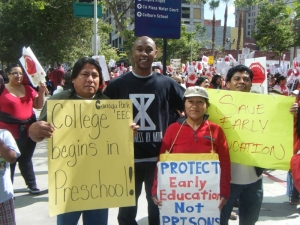Coursework Equals Advocacy for Policy Students
September 03, 2013 / by Susan Wampler- Opinion
Students in the USC School of Social Work’s social welfare course (SOWK 535) learn by doing, engaging in advocacy and persuasion for positive social change. From writing editorials and creating public service announcements to rallying for reform and lobbying government officials, they are making their voices heard on policy while helping others. And, thanks to the course’s availability through the school’s online Master of Social Work degree program, those efforts reach far beyond Los Angeles.
“Our scope is national,” says Samuel Mistrano, clinical associate professor at the USC School of Social Work. “In the Spring 2013 semester alone, more than 400 students took the course in hundreds of communities across the United States.”
The course emphasizes how policy is developed and implemented—knowledge that is foundational to any social work career, as social welfare policy shapes who gets access to limited resources and services. By learning and performing advocacy, students gain a vital tool they will continuously use to respond to and address the social needs of individuals, groups and communities.
The structure of USC’s course provides students with guidance, examples, peer support and practice in policy advocacy. The SOWK 535 curriculum also expands their knowledge of persuasive writing, the importance of which is actually growing in a world dominated by social media and online outlets. Assignments include an individual research paper and group presentation addressing a social problem, including a briefing to a mayor; an experiential assignment in which students directly engage in activism on an issue they have investigated; and an editorial they write and submit to an appropriate media outlet.
Mistrano and his fellow faculty members have good reason to be proud of their students’ work.
“Dozens of editorials by our students have been published across the nation,” he observes. “Some appear in major media outlets, potentially influencing hundreds of thousands of readers on social welfare issues.”
Other efforts that are part of the class are more hands-on, helping people directly. Lauren Eccker, Ikiah McGowan, Diana Aguayo and Shifra Lever volunteered for the Monday Night Mission on Los Angeles’ Skid Row, helping feed nearly 200 homeless people per night. Joshua Letuligasenoa, Michelle Cativo, Gloria Gamboa and Amber Price-Murphy organized a fundraiser that raised $8,000 to help elect Eric Garcetti as mayor of Los Angeles. Another group of students even ventured into multimedia production—creating a YouTube video and website (www.uscpolicy.org) to promote awareness among policymakers of the Empowerment Through Rehabilitation Act (ERA), which aims to improve the juvenile justice system and reduce recidivism rates.
The course’s activism encompasses states red, blue and purple, addressing issues related to veterans, jobs, homelessness, health care, violence and political corruption, to name just a few. Sometimes students use their budding media savvy to bring needed attention to the service organizations where they are working. While interning with Heal with a Horse—a Western Michigan organization that helps children with chronic illnesses and disabilities by letting them bond with horses—Christina Cooper discovered that the all-volunteer nonprofit desperately needed funding to keep its doors open. She made fliers, created a Facebook page and convinced a local TV news show to report on the group’s therapeutic—and community—benefits, and people opened their hearts and wallets.
“We got calls from people wanting to hold fundraisers on behalf of the program, and random people started sending money,” says Cooper.
The examples go on and on. In Cedar City, Utah, Vivian Dye built awareness to support autism programs, leading to a public proclamation from Mayor Joe Burgess during Autism Awareness Month. In Northfield, Minn., Sara Kaiser put her social work counseling skills to use at an apartment complex, helping teen women who had experienced dating violence—efforts that were reported on by the local media. Thanks to her work, the city council named February “Teen Dating Violence Prevention and Awareness Month.” In Pleasantville, N.J., Elizabeth Flores personally lobbied the mayor to increase anti-gun-violence programs.
Sometimes the efforts succeed, other times they fail—and even then, the failures give valuable lessons in the transition from student to professional.
“The course opened my eyes to the potential things I could do that I had never thought of before,” adds Cooper.
With a number of sections taught by several of the school’s top faculty members, who also act as watchful mentors, the beneficial impact of SOWK 535 will be felt nationwide for generations to come. Its influence will widen even further as more students graduate and embark on their own careers.
To reference the work of our faculty online, we ask that you directly quote their work where possible and attribute it to "FACULTY NAME, a professor in the USC Suzanne Dworak-Peck School of Social Work” (LINK: https://dworakpeck.usc.edu)
